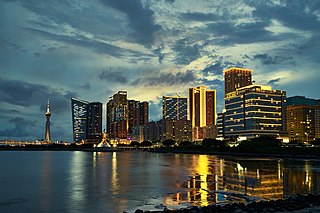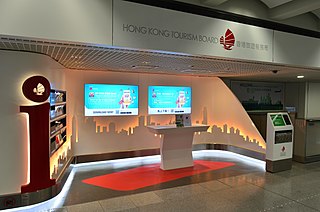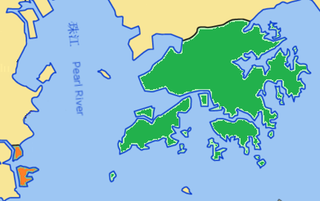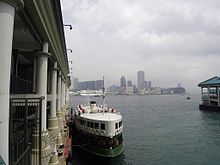
The economy of Macau has remained one of the most open in the world since its handover to China in 1999. Apparel exports and gambling-related tourism are mainstays of the economy. Since Macau has little arable land and few natural resources, it depends on mainland China for most of its food, fresh water, and energy imports. Japan and Hong Kong are the main suppliers of raw materials and capital goods. Although Macau was hit hard by the 1997–98 Asian financial crisis and the early 2000s recession, its economy grew approximately 13.1% annually on average between 2001 and 2006. Macau is a full Member of the World Trade Organization. Public security has greatly improved after handover to the People's Republic of China. With the tax revenue from the profitable gambling industry, the Macau government is able to introduce the social welfare program of 15 years of free education to all Macau citizens. In 2015, Macau's economy saw a sharp decrease due to the reduced spending by visitors from Mainland China since the Anti-corruption campaign under Xi Jinping.
The Three Links or Three Linkages was a 1979 proposal from the National People's Congress of the People's Republic of China (PRC) to open up postal, transportation, and trade links between Mainland China and Taiwan, with the goal of unifying Mainland China and Taiwan.

The Individual Visit Scheme begun on 28 July 2003 allowing travelers from Mainland China to visit Hong Kong and Macau on an individual basis; prior to the Scheme, Mainland residents could only visit on business visas or on group tours.
Right of abode in Hong Kong entitles a person to live and work in the territory without any restrictions or conditions of stay. Someone who has that right is a Hong Kong permanent resident. Foreign nationals may acquire the right of abode after meeting a seven-year residency requirement and are given most rights usually associated with citizenship, including the right to vote in regional elections. However, they are not entitled to hold territorial passports or stand for office in some Legislative Council constituencies, unless they also naturalise as Chinese citizens.

Tourism is a major industry in Macau. It is famous for the blend of Portuguese and Chinese cultures and its gambling industry, which includes Casino Lisboa, Macau, Sands Macau, The Venetian Macao, and Wynn Macau.

The Hong Kong Special Administrative Region Passport is a passport issued only to permanent residents of Hong Kong who also hold Chinese citizenship. In accordance with the Basic Law of the Hong Kong Special Administrative Region, since the handover in 1997, the passport has been issued by the Immigration Department of the Government of Hong Kong under the authorisation of the Central People's Government of the People's Republic of China. As the official languages of Hong Kong are Chinese and English, the passport is printed bilingually in both Chinese and English. In addition, unlike Chinese passport which can be issued by Chinese diplomatic missions abroad, the Immigration Department of Hong Kong is the only issuing authority for HKSAR passports.

The Hong Kong identity card is an official identity document issued by the Immigration Department of Hong Kong. According to the Registration of Persons Ordinance, all residents of age 11 or above who are living in Hong Kong for longer than 180 days must, within 30 days of either reaching the age of 11 or arriving in Hong Kong, register for an HKID. HKIDs contain amongst others the name of the bearer in English, and if applicable in Chinese. The HKID does not expire for the duration of residency in Hong Kong.

The Hong Kong Tourism Board (HKTB) is a Government-subvented body founded in 2001. The Board replaced the Hong Kong Tourist Association (HKTA) established in 1957. It has 15 branch offices and representative offices in 6 markets around the world, and its primary mission is to maximize the social and economic contribution that tourism makes to the community of Hong Kong, and consolidate the city's position as a desired destination. HKTA works with the Government, travel industry and other partners to market and promote Hong Kong worldwide, improving the range and quality of visitor facilities and tourism service standards, and enhancing the experiences of visitors.

Birth tourism is the practice of traveling to another country or city for the purpose of giving birth in that country. The main reason for birth tourism is to obtain citizenship for the child in a country with birthright citizenship. Such a child is sometimes called an "anchor baby" if their citizenship is intended to help their parents obtain permanent residency in the country. Other reasons for birth tourism include access to public schooling, healthcare, sponsorship for the parents in the future, hedge against corruption and political instability in the children’s home country. Popular destinations include the United States and Canada. Another target for birth tourism is Hong Kong, where some mainland Chinese citizens travel to give birth to gain right of abode for their children.

The People's Republic of China Passport is a passport issued to citizens of the People's Republic of China for the purpose of international travel, and entitles its bearer to the protection of China's consular officials overseas.

Visitors to the Republic of China (Taiwan) must obtain a visa or authorization in advance, unless they come from one of the visa exempt countries or countries whose nationals are eligible for visa on arrival. All visitors must hold a passport valid for 6 months.

The Government of the Macau Special Administrative Region allows citizens of specific countries/territories to travel to Macau for tourism or business purposes for periods ranging from 14 to 180 days without having to obtain a visa. For other entry purposes, such as establishing residence on a long-term basis, a different policy applies.

Visitors to the mainland of the People's Republic of China must obtain a visa from one of the Chinese diplomatic missions unless they are citizens of one of the visa-exempt countries. The residents of Hong Kong, Macao, and Taiwan with Chinese nationality may stay in Mainland indefinitely as long as their travel documents are valid.

The visa policy of Hong Kong deals with the requirements in which a foreign national wishing to enter Hong Kong through one of the 15 immigration control points must meet to obtain an entry permit or Visa, which depending on the traveller's nationality, may be required to travel to, enter, and remain in the Hong Kong Special Administrative Region. Visitors from over 145 countries are permitted without Visa entry for periods ranging from 7 to 180 days, to the Hong Kong Special Administrative Region for tourism or certain business-related activities. All visitors must hold a passport valid for more than 1 month.

The British National (Overseas) passport, commonly referred to as the BN(O) passport, is a British passport for people with British National (Overseas) status. BN(O) status was created in 1987 after the enactment of Hong Kong Act 1985, whose holders are permanent residents of Hong Kong who were British Overseas Territories citizens until 30 June 1997 and had registered as BN(O)s.

e-Channel, also known as The Automated Passenger Clearance System, is an expedited border control system introduced by the Hong Kong Immigration Department in 2004, designed to speed up border immigration processes for residents of Hong Kong, Macau and frequent visitors to Hong Kong entering and exiting the territory whether it be by land, air or sea via the use of self-service kiosks employed at various border control points.
Mainland Chinese or mainlanders are Chinese people who live in or have recently emigrated from mainland China, defined as the territory governed by the People's Republic of China (PRC) except for Hong Kong, Macau, and the partly-PRC-controlled South China Sea Islands, and also excluding certain territories that are claimed by the PRC but not controlled, namely Taiwan a.k.a. the "Republic of China" (ROC), which is a state with limited recognition, and other associated territories that are ruled by Taiwan. The term also refers to historical groups of people of Chinese origin who immigrated to Hong Kong, Macau and Taiwan during the 20th century, especially in the context of specific historical events.
The term "anchor babies in Hong Kong" refers to children born in Hong Kong whose parents are not Hong Kong permanent residents.
Shenzhen–Hong Kong cross-boundary students are people who are born and study in Hong Kong but live in mainland China. In a daily student migration, every school day they arrive in and exit from Hong Kong primarily through 5 land boundary control points: Lo Wu, Sha Tau Kok, Lok Ma Chau, Man Kam To, and Shenzhen Bay. They mainly study in Yuen Long, Tuen Mun, Tai Po while the majority in the North district.

Hong Kong–Macau relations refers to bilateral relations between Hong Kong and Macau.



















